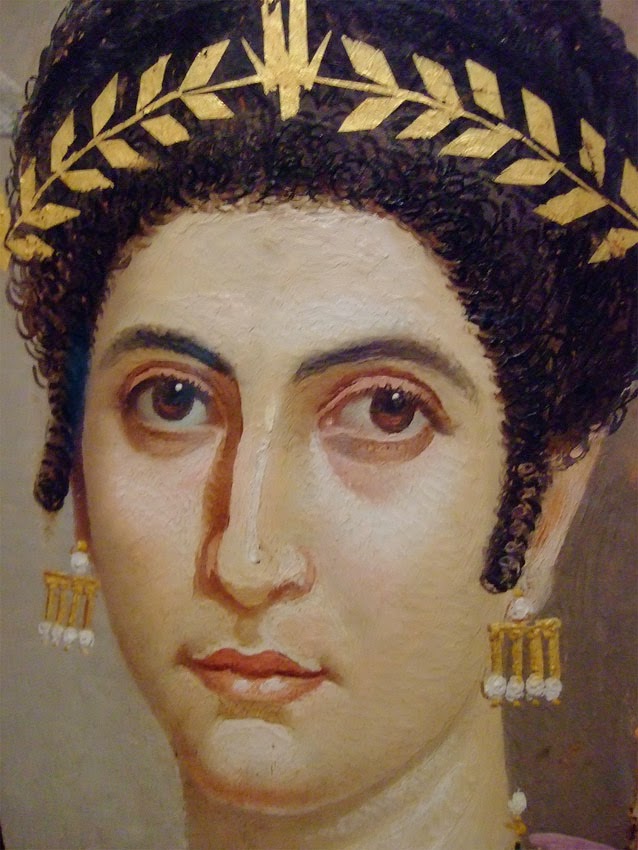The Bon Dea Conspiracy provided Cicero what he needed to irritate Clodios for years:
- Cicero was quite a conservative
- Cicero was an optimate, whereas Clodios was a populare and a rebel/bad boy*
- Clodios perjured himself at the trial for the Bon Dae Conspiracy and Cicero could prove it
- Crassus decided the final out come of the trail, via bribes, Clodios was acquitted
 |
| Cicero |
 |
| Publius Clodios Pulcher |
Never the less, Clodios wanted to get Cicero back for making him look bad in court. (Clodios's power was a power of the people. They loved him. He increased the grain dole and had a way with the crowd. He also had a retinue of gladiator guards to make sure he was ok.) Over the years Cicero would use the Bona Dea Conspiracy to poke Clodios politically as he, Clodios, was also politically ambitious. *Clodios was fond of the more lascivious pleasures in life. "Publius Clodios out from his saffron dress, from his headdress, from his Cinderella slippers and his purple ribbons, from his breast band, from his dereliction, from his lust, is suddenly rendered a democrat." ~ Cicero of Clodios
When Clodios became a tribune he enacts a law to exile anyone who execute(s) a Roman citizen without a trial. This was primarily aimed at Cicero. Cicero had the members of the Catiline Conspiracy executed four years previously when he was consul. Cicero was accountable for any 'crimes' committed while in office after the term of his office, even as consul. As a result, Cicero is sent into exile. His villa(s) on Palatine Hill, Tusculum and Formae are destroyed and his property confiscated. This must have been very difficult for Terentia as their son Marcus was only seven years old at this time and they did not accompany Cicero on his exile. Tullia's husband, Gaius Calpurnius Piso Frugi, or just Piso; worked for Cicero's return from exile.
After one year, Cicero was allowed to return from exile. He wasn't as free handed in his political views due to the ramifications he had suffered. He went back to practicing law, mostly in support of the fellows in the First Triumvariate: Caesar, Pompey and Crassus and writing. He wrote his speeches down and wrote on the return to traditional/constitutional values that made the republic great. Whereas, Clodios, who had many enemies, was killed in a skirmish on his way home from a talking to local officials in another town shortly after Cicero's return.
I cannot help but thinking both men were political pawns in a game for power by Caesar and Pompey. Crassus would be included too, but he was busy preparing for the Parthian campaign and the glory of war with his seven legions. Pompey, the
optimate turned
populare, and Caesar, the rising star. They all wanted power. Clodios was under the impression that he had more power than he actually did and Cicero, the consummate politician and academic, believed in the Roman Constitution. Both men naïve in their own ways. Men ultimately seek power and stop at nothing, but death, to get it.
These small asides amuse me. They are real, but read like fables. Do not be fooled, all that glitters is not gold. To be fair, it truly seems like Cicero had pure intentions from everything I have read. And Clodios was in love with himself, first, and power overall. Some things never change.
Bona Dea -
Bona Dea Festival in celebration of the Good Goddess. She is the Roman Goddess of Earth and Bountiful Blessings. She is the symbol of life and health. Her festival is celebrated on the evening of May 4 and is for Women ONLY. The festival was at the Temple of the Vestal Virgins, but then a prominent female member of Roman society would host a ladies only celebration. Bona Dea had no priestess of her own.
Bona Dea - The Good Goddess
Bon Dea Conspiracy -
Clodius dressed up as a woman and went to the Bona Dea celebration at Caesar's house as he had a crush on Caesar's wife Pompeia. He was found out at the party by slaves and hence the conspiracy of a man at a female only celebration.
Caesar divorced Pompeia as Caesar's wife had to be beyond reproach and there was a trial which, as stated above, caused Clodios and Cicero to face off. Clodios looked bad in front of the people when he perjured himself and he never forgave Cicero for doing that. It took time, but Clodios got his revenge by having Cicero exiled when he became tribune.










